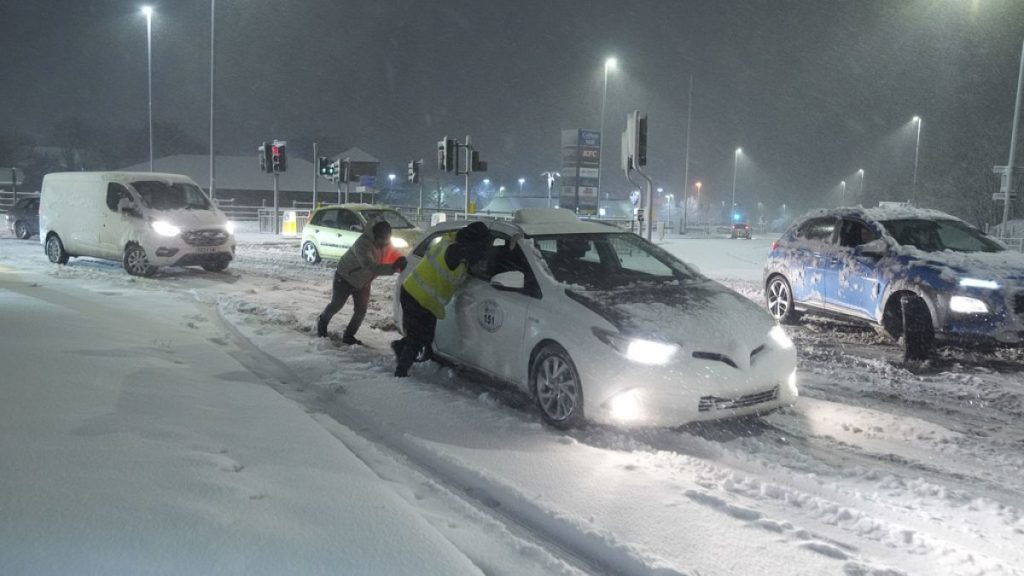The United Kingdom is grappling with a significant spell of heavy snowfall, leading to widespread disruption, particularly impacting air travel in the northern regions. Several major airports, including Manchester, Liverpool John Lennon, and Leeds Bradford, have been forced to temporarily close their runways due to the accumulation of snow. Manchester Airport, a key international hub, has diverted all incoming flights to alternative destinations as landing became impossible amidst the challenging conditions. Liverpool John Lennon Airport is actively working to clear its runway and restore operations, while Leeds Bradford Airport is also experiencing a cascade of cancellations and delays, leaving passengers stranded and travel plans in disarray. The severe weather conditions are expected to persist throughout Sunday, prompting authorities to issue urgent warnings and advise the public to exercise caution.
The UK’s Met Office, the national weather service, has issued a series of weather warnings encompassing a wide swathe of the country. These warnings include six yellow alerts and two more serious amber alerts, signifying a potential risk to life and property. The amber warnings are in effect for the Midlands, Wales, and parts of northern England, highlighting the severity of the weather event in these regions. The Met Office forecasts significant snowfall, with accumulations of up to 40 centimeters anticipated in the most affected areas. This heavy snowfall, combined with freezing rain and ice, is creating hazardous conditions on roads and railways, leading to widespread travel disruptions. The warnings also highlight the potential for power outages due to the strain on infrastructure caused by the extreme weather.
The heavy snowfall and icy conditions are creating treacherous travel conditions across the affected regions. The Met Office has warned of potential delays and cancellations on train services, urging passengers to check their travel plans before embarking on their journeys. Road travel is also significantly impacted, with the risk of accidents heightened due to slippery surfaces and reduced visibility. Authorities are advising against non-essential travel in the affected areas. The combination of snow, ice, and freezing rain poses a significant risk to pedestrians as well, with the potential for slips and falls. The Met Office is urging the public to exercise extreme caution when venturing outdoors and to be mindful of the hazardous conditions.
The impact of the heavy snowfall extends beyond transportation disruptions. The accumulation of snow can cause structural damage to buildings and infrastructure, and the freezing temperatures can lead to burst pipes and other weather-related issues. The Met Office is advising residents to take precautions to protect their homes and property, including clearing snow from roofs and ensuring adequate insulation to prevent pipes from freezing. The prolonged period of cold weather can also pose health risks, particularly to vulnerable populations such as the elderly and those with pre-existing medical conditions. Authorities are urging the public to check on vulnerable neighbors and family members and to ensure they have access to heating and essential supplies.
The widespread disruption caused by the heavy snowfall underscores the importance of preparedness and resilience in the face of extreme weather events. The Met Office’s timely warnings and advisories are crucial in enabling individuals and communities to take necessary precautions and mitigate the impact of the severe weather. The coordinated efforts of emergency services, transport operators, and local authorities are essential in responding to the challenges posed by the heavy snowfall and ensuring the safety and well-being of the public. The ongoing weather event serves as a reminder of the increasing frequency and intensity of extreme weather events, highlighting the need for continued investment in infrastructure and preparedness measures to enhance resilience in the face of future climate challenges.
The UK’s experience with this significant snowfall event provides valuable lessons for other regions facing similar weather challenges. The importance of accurate and timely weather forecasting, effective communication of warnings and advisories, and coordinated emergency response efforts are crucial in minimizing the impact of such events. The disruption to transportation, infrastructure, and daily life underscores the need for robust preparedness measures and the development of resilient infrastructure. As climate change continues to influence weather patterns and increase the likelihood of extreme weather events, the UK’s experience serves as a valuable case study in the importance of proactive planning and adaptation strategies to mitigate the impacts of these events on communities and economies.














